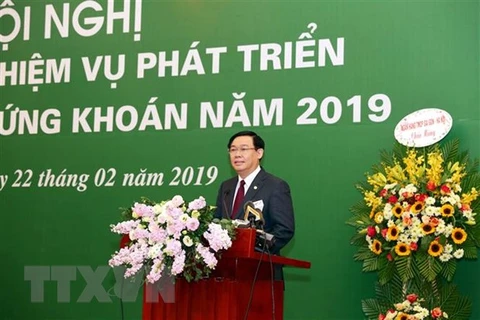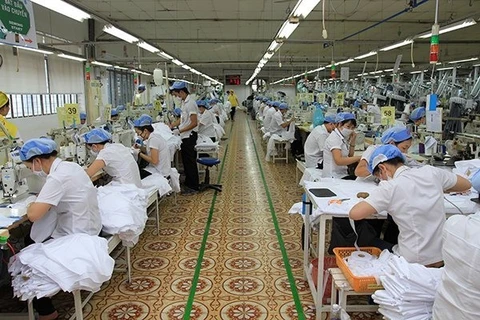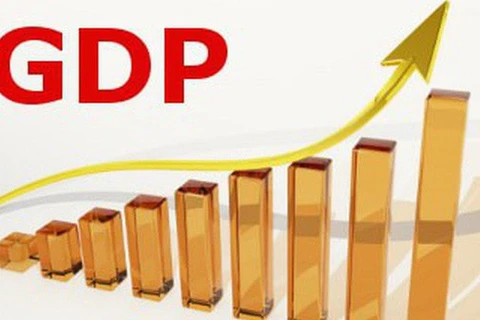
Hanoi (VNA) - Experts have held that the economy is highly likely to continue the momentum created last year to achieve a breakthrough in 2019. However, they also warned that there will be quite a few difficulties and challenges on the way to realise this expectation.
In the context that the international economy is encountering more and more uncertainties and the room for macro-economic policies to accelerate the economic growth is shrinking, the Government still continues prioritizing the macro-economic stability, improving the business environment and resilience of the economy. Accordingly, the development of economic growth and inflation continued to be placed under a close watch by the Government throughout the first quarter with regular moves and messages.
[Positive signs in Q1 socio-economic situation]
The content was mentioned by Nguyen Anh Duong, head of the General Research Department of the Central Institute of Economic Management (CIEM) at the conference on “Vietnam’s Macro Economy: Persisting Reform Amidst World’s Uncertainties” held on April 19.
QI GDP lower than expectation
According to Duong, the GDP growth in the first quarter was 6.79 percent, lower that the same period last year as well as the initial plan by the government. However, the figure was still higher that the same period of the 2009-2017 period. Yet, to achieve the goal set for the whole year, Vietnam will encounter quite a few challenges in the remainder of 2019 as the economy will continue the momentum in growth expansion but the potential growth pace (manifested in the GDP growth trend) will slow down.
“The results of the growth recovery over the recent years are largely attributed to the reforms of the economic institutions in general and the business environment in particular,” Duong pointed out.
Besides the achievements, a report by the CIEM also revealed numerous challenges in many economic sectors. Optimism among enterprises that are strongly restructuring, especially in the fields of processing and manufacturing, is fading. The “chronical” problem of the difficulties meeting the business community in joining the market remains unsolved. Besides, the biggest problems of “post-registration” and transparent information access still linger on in efforts to improve the business environment.
 Participants in the conference on “Vietnam’s Macro Economy: Persisting Reform Amidst World’s Uncertainties” held by the CIEM on April 19 (Photo: VietnamPlus)
Participants in the conference on “Vietnam’s Macro Economy: Persisting Reform Amidst World’s Uncertainties” held by the CIEM on April 19 (Photo: VietnamPlus) Administrative price control
As for inflation, explain the causes that impact the average CPI in the first quarter with a growth of 2.63 percent, the authors of the CIEM report pointed to a number of factors, including the decrease in the price index in the group of food, along with the rise in the electricity prices at the end of March which had not been fully reflected in the CPI.
Another noteworthy point mentioned in the report is that the way to reign in the market prices is still heavily “administrative”.
Besides, the average core inflation index rise of 1.83 percent, according to the authors, proves that the management of the monetary policy is stable, leading to no pressure of prices.
And after analysing the macro-economic indexes for the first quarter, the authors of the report forecast that the economic growth for the whole year will be 6.88 percent, with export growth projected at 9.02 percent, regional trade surplus at 3.1 billion USD, and consumer price increase for 2019 at about 3.71 percent.
Equitisation quality yet to improve
Besides, accessing the equitisation of State-run enterprises in the 2017-2018 period, the report pointed out various challenges lying ahead. The authors laid a special stress on the fact that the initial public offering of shares will meet with more difficulties while the quality of equitisation has not shown any sign of improvement.
One of the causes of the above-mentioned situation is the responsibility of the heads in the implementation of the equitization plan, worsened by the not-so-serious enforcement of administrative disciplinary measures and the unclear mechanism to deal with violations.
As the implementation of the Comprehensive and Progressive Agreement for Trans-Pacific Partnership (CPTPP) is a focus of expectation by high-rankiing leaders and domestic enterprises, Duong said the guiding and amendments of the law on the implementation is moving at a “snail’s pace” and the efficiency is still slow to be improved./.
























